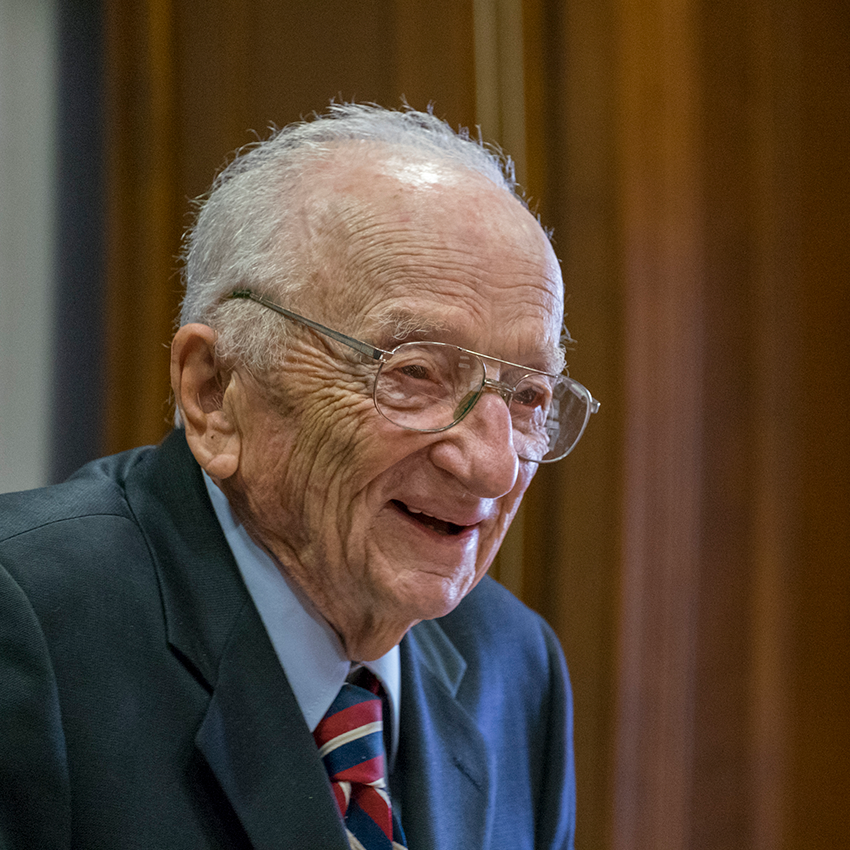
Cardozo School of Law and Yeshiva University mourn the passage of Benjamin B. Ferencz, the last surviving prosecutor of the Nuremberg trials and a deeply passionate supporter and friend of Cardozo Law School and its students, who died on April 7 at an assisted living facility in Boynton Beach, Fla. He was 103.
Ferencz oversaw the largest trial of Nazi war criminals, negotiated reparations for concentration camp victims, and went on to be one of the founders of the International Criminal Court. He spoke frequently at Cardozo about the use of law in international human rights struggles. He gave a substantial donation to the law school for the Benjamin B. Ferencz Human Rights and Atrocity Prevention Clinic, a unique law school clinic within the Cardozo Law Institute in Holocaust and Human Rights.
On April 11, 2016, Cardozo students of the Cardozo Journal of Conflict Resolution awarded him the International Advocate for Peace Award and had the privilege of hearing Ferencz describe his work in detail, including the story of bailing out of a burning airplane over war torn Berlin while on a flight to the Nuremberg Nazi war trials.
"As a man who helped give the world the concept of law not war, and helped define how war crimes could be prosecuted under international law, we owe so much to Ben Ferencz,” said Dean Melanie Leslie. "Today, we mourn the passage of a giant in the field of international law and human rights, and a dear friend of Cardozo who cared deeply for our law students and supported their legal education in pursuit of peace and justice. Cardozo Law School and Yeshiva University are filled with gratitude to Ben Ferencz for his consistent support of our human rights programs."
As a lead prosecutor of the Nuremberg Trials, Ferencz brought to justice leaders of Nazi Germany who planned, carried out, and participated in the Holocaust. Following Nuremberg, he continued in Germany and then in the United States to fight for and set up reparations programs. His book Less than Slaves describes his tireless efforts to secure compensation for the forced labor of concentration camp inmates. As one of the founding architects of the International Criminal Court, he helped create the machinery to hold governments accountable for war crimes, and as a champion of peace, Ferencz made the end of war his life’s work.
Ferencz saw the devastation of World War II up close as a soldier in the U.S. Army. Near the end of the war, he was assigned to a team tasked with setting up a war crimes branch and collecting evidence. As part of that work, he went to Nazi concentration camps as they were being liberated. The Nuremberg Trials gave legitimacy to the concept that the world could prosecute those in governments who had committed atrocities against their own citizens, and citizens from other countries.
Speaking to students, Ferencz talked in depth about his experience at the age of 27 of being on the team that uncovered the existence of Nazi Einsatzgruppen, execution squads who went ahead of German military advances and murdered every Jew they could find. As chief prosecutor at the Einsatzgruppen trial, Ferencz detailed how these groups killed one million people. The 22 Nazi leaders he proved responsible were all convicted; 14 of them received death sentences.
His leadership in the struggle to find alternatives to war over the decades was noted by Cardozo students presenting him the Advocacy for Peace Award.
“You remind us that, in resolving conflicts throughout the course of our own professional pursuits, we should preserve the humanity of a process that holds us together, and not be discouraged by the inhumanity that tries to tear us apart," the students wrote.
Ben Ferencz’s connection to Cardozo is a personal one forged through his special relationship with one of the school’s founding faculty members, Telford Taylor, who was the lead prosecutor in the Nuremberg Trials and a towering figure on the international stage. These trials and the work of Taylor and Ferencz would focus the world’s attention on the perpetrators of war atrocities and create a new methodology for seeking international justice. In so doing, Taylor and Ferencz altered history and their work brought to the international conscience the legal concept of crimes against humanity.
In this brief video in 2017 Ferencz urged students at Cardozo to pursue human rights justice and said, “You have to think outside the box. You cannot accept the traditional thinking. Challenge everything. You have to have fire in the belly, and you must be determined and to keep on going, no matter what.” He concluded by saying in emphasizing the summary of his belief as “Law not war, and never give up.”
See his interview at Cardozo, linked below
https://www.facebook.com/cardozolaw/videos/10155559781305549/
